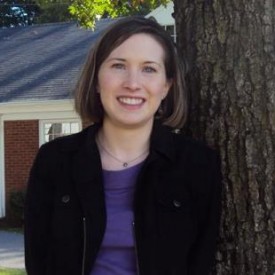As a first-time attendee of Writer’s Digest Conference, I was thrilled to spend three days learning about the craft and business of writing. And with presentations offered on a wide range of topics including genre studies, writing techniques, and marketing strategies, I made sure to dabble in each. What I didn’t expect was that even with all the variety, several themes about today’s writing career would emerge throughout the event.
We’ve covered literary themes quite a bit here at DIY MFA. Maybe it’s no coincidence that themes would also arise from a literary conference like Writer’s Digest Conference. However, those common threads wove together in a way that the audience returned home with a clearer picture of our art and the industry that comes with it.
Here is a glimpse at some of the themes from WDC 2015, and what authors, agents, and other industry leaders had to say about them.
Don’t Be Afraid of Your Author Platform
Establishing an author platform is recommended for all writers, especially nonfiction writers. A number of presenters stated that if a nonfiction writer has no website, blog, or social media presence, agents and publishers will not consider his proposal.
How can nonfiction writers create an author platform? Author M.J. Rose recommended presenting themselves as subject matter experts and creating a blog focused on their chosen topics. Literary agent Dawn Michelle Hardy extended that concept to social media. She suggested writers to follow authors or other people who complement their area of expertise, and to share content that aligns with one’s interests and provides value to readers in hopes of forming a lasting writer-audience relationship.
At the same time, presenters cautioned against the dangers of relying too heavily on social media statistics. “Twitter followers don’t always translate into book sales,” said literary agent Alec Shane. In other words, just because someone follows you via social media doesn’t mean he or she will buy your book. Shane added that such figures on Twitter, Facebook, and other sites are rarely a deciding factor in book deals for fiction writers.
The most resonant advice on author platforms, however, came from Jessica Strawser, Editor of Writer’s Digest Magazine: “Everything we do online should come from a place of authenticity.” Ultimately, readers are interested in learning more about writers themselves, not only the books. Remember to share bits about your process and non-writing interests, and to show interest in your followers and their feedback.
Be Part of a Writing Community
Other presenters talked about the impacts of a writing community, which is one of the DIY MFA’s core values. DIY MFA Creative Director Gabriela Pereira discussed this at length, emphasizing the importance of networking with writers, finding reliable critique partners, and connecting with readers. Her final reminder was, “You are not alone.” It sounds so simple, but it’s so true. Writers must reach out to others so their writing processes can be a less solitary and more rewarding activity.
Panelists from the popular blog Writer Unboxed also talked about their site’s community. Porter Anderson highlighted the respectful exchange of ideas with blog readers, while Donald Maass credited Writer Unboxed with giving him and other agents a better understanding of writers and their process. Vaughn Roycroft said that Writers Unboxed “kept me from quitting” writing altogether after being disappointed by other, more hostile online groups. All of these points – healthy discussions, the sharing of advice, motivation – are only a pinchful of the benefits of joining a writing community.
No one summed up the need for a writing community better than author Jonathan Maberry during his keynote speech. “Writers should help other writers,” he said. “If more writers help one another, more good books will be written, more good books will be sold, and the publishing industry as a whole will prosper.” If we practice honesty and positivity when interacting with readers and other writers, it can only help make the writing community at large a better place.
Advocate for Your Work – and Yourself
Changes in the publishing industry have placed more responsibility on writers for their books’ marketing. Authors and agents alike shared successful strategies, from getting readers in on the act to finding avenues outside of bookstores for selling your books. And as author Kristen Harnisch revealed, writers never know who they’ll meet or when new promotional opportunities will come along. “You are your best advertiser,” she said. “Always have your elevator pitch ready.”
Besides being their work’s strongest advertiser, writers also need to advocate for themselves. Phil Sexton, Publisher of Writer’s Digest, encouraged attendees to ask as many specific questions as possible once they have a book deal, and to volunteer time to help their publishers with marketing and other efforts. He also cautioned attendees on how to approach publishers during that time. “Be patient and persistent,” he said. “Have an open dialogue with them, but never antagonize them.”
Focus on Your Writing
Above all, presenters at WDC 2015 agreed on one activity that writers should focus on most: writing. And why not? Despite all of the responsibilities that come with the career, writers can only be writers if they make time for their craft.
Two authors in particular reminded attendees to prioritize writing over social media and marketing. “Write more books,” said M.J. Rose. “It’s the hardest thing to do, but it’s going to sell you more books in the end.” Therese Walsh echoed this idea during the Writer Unboxed panel: “Be protective of your time so you can focus on writing. Only give yourself to other efforts if they’re worthy.”
All three keynote speeches also concentrated the trials and triumphs of writing. Jonathan Maberry talked about practicing versatility in writing to learn new things and break out of “pigeonholes,” while Jacqueline Woodson shared some of the inspirations behind her award-winning novels. Tim Johnston offered a humorous, eye-opening view at how he built houses for a living while building his career as an author – a long road that taught him persistence and patience. One of his final points was, “Don’t be in a hurry to publish. Take the time you need to become the writer you want to be.”
If anything, the greatest takeaway from the 2015 Writer’s Digest Conference is that today’s writing career is a balancing act. Not only do writers need to write, but they need to be a jack-of-all-trades in order to navigate the publishing industry with confidence and success. It may sound intimidating, but if writers take a deep breath and learn how to strike the right balance, they can achieve the career they’ve always wanted.
…………….
 Sara Letourneau is a Massachusetts-based writer who practices joy and versatility in her work. In addition to writing a fantasy novel, she reviews tea at A Bibliophile’s Reverie and is a guest contributor for Grub Street Daily. She’s also a published poet whose works have appeared in The Curry Arts Journal, Soul-Lit, The Eunoia Review, Underground Voices, and two anthologies. Learn more about Sara at her personal blog, Facebook, and Twitter.
Sara Letourneau is a Massachusetts-based writer who practices joy and versatility in her work. In addition to writing a fantasy novel, she reviews tea at A Bibliophile’s Reverie and is a guest contributor for Grub Street Daily. She’s also a published poet whose works have appeared in The Curry Arts Journal, Soul-Lit, The Eunoia Review, Underground Voices, and two anthologies. Learn more about Sara at her personal blog, Facebook, and Twitter.






